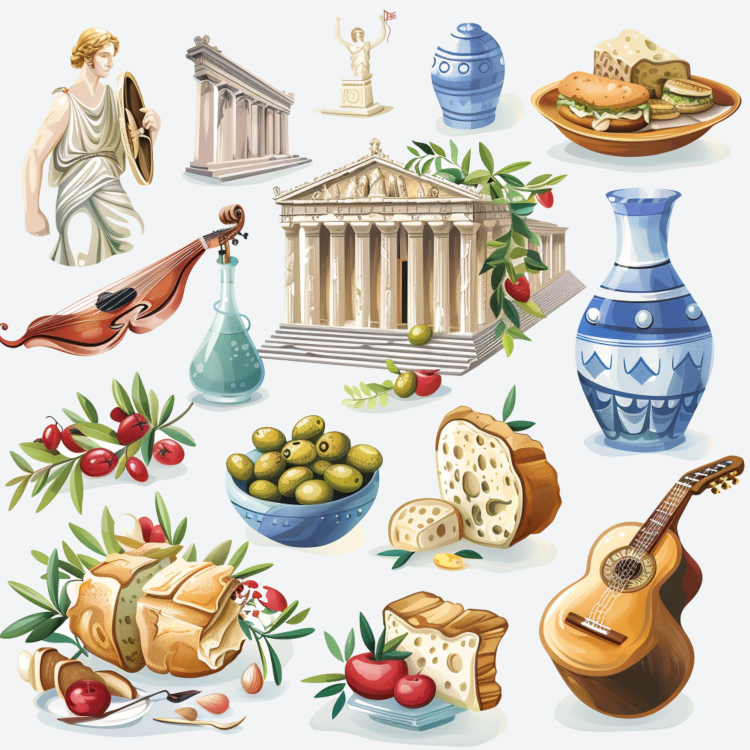About GR

Greece is a country located in southeastern Europe, on the southern end of the Balkan Peninsula. Here are some basic facts about Greece:
Population: As of 2021, the population of Greece is estimated to be around 10.7 million people.
Language: The official language of Greece is Greek, which is a member of the Hellenic branch of the Indo-European language family. English is also widely spoken, especially in tourist areas.
Currency: The official currency of Greece is the Euro (EUR).
Government: Greece is a parliamentary representative democratic republic. The President of Greece is the head of state, and the Prime Minister is the head of government.
Economy: Greece has a mixed economy that is heavily reliant on the service sector, particularly in tourism. The country also has a significant agricultural sector, including olives, grapes, and wheat.
Geography: Greece covers an area of approximately 131,957 square kilometers, making it the 97th largest country in the world. Greece is located at the crossroads of Europe, Asia, and Africa, and is surrounded by the Aegean, Ionian, and Mediterranean Seas. Greece shares land borders with Albania, North Macedonia, Bulgaria to the north, and Turkey to the east.
Climate: Greece has a Mediterranean climate with hot, dry summers and mild, wet winters. The country experiences frequent droughts and wildfires during the summer months.
Culture: Greece has a rich cultural heritage, with a long history that dates back to ancient times. The country is known for its contributions to philosophy, art, architecture, and literature. Greece is also famous for its cuisine, which includes dishes such as moussaka, tzatziki, and souvlaki. The country is home to numerous festivals and cultural events throughout the year, including the Athens and Epidaurus Festival, the Thessaloniki International Film Festival, and the Patras Carnival.

National Culture Objects
Acropolis of Athens
The Acropolis of Athens, especially the Parthenon, is a symbol of ancient Greek civilization and architectural brilliance. It represents Greece's rich historical heritage and contributions to art, philosophy, and democracy.
Olive Tree and Olive Oil
The olive tree is a symbol of peace and prosperity in Greek culture. Olive oil, derived from these trees, is a staple in Greek cuisine and represents the country's agricultural traditions and Mediterranean diet.
Greek Mythology
Greek mythology, with its pantheon of gods and heroes, is central to Greek cultural heritage. Figures like Zeus, Athena, and Hercules symbolize Greece's rich storytelling traditions and influence on Western literature and art.
Souvlaki
Souvlaki, a popular Greek dish consisting of skewered and grilled meat, symbolizes Greece's culinary traditions. It represents the importance of simple, flavorful, and communal eating in Greek culture.
Bouzouki
The bouzouki is a traditional Greek stringed instrument used in folk music and rebetiko. It symbolizes Greece's musical heritage and the enduring popularity of its traditional sounds.
Greek Columns
Greek columns, particularly the Doric, Ionic, and Corinthian styles, symbolize ancient Greek architectural innovation. They represent Greece's influence on Western architectural aesthetics and principles.
Blue and White Houses of Santorini
The iconic blue and white houses of Santorini are symbols of Greece's picturesque landscapes and architectural style. They represent the beauty of the Greek islands and the harmonious blend of natural and built environments.

The national anthem of Greece is called "Hymn to Liberty" or "Ύμνος εις την Ελευθερίαν" in Greek. The lyrics were written by Dionysios Solomos in 1823 and the music was composed by Nikolaos Mantzaros in 1865. It was officially adopted as the national anthem of Greece in 1865.
Here are the Greek lyrics of the national anthem:
Σε γνωρίζω από την κόψη
Του σπαθιού την τρομερή,
Σε γνωρίζω από την όψη
Που με βιά μετράει τη γη.
Απ' τα κόκκαλα βγαλμένη
Των Ελλήνων τα ιερά,
Και σαν πρώτα ανδρειωμένη,
Χαίρε, ω χαίρε, ελευθεριά!
And here is an English translation of the Greek national anthem:
I know thee by the fierce sword
That thou holdest, in thy hand;
I know thee by the flaming glance
Of thy eyes, so proud and grand.
From the graves of our slain fathers
Comes the sacred voice we hear,
And like a watchword to the sons
The cry of 'Freedom' echoes clear.


